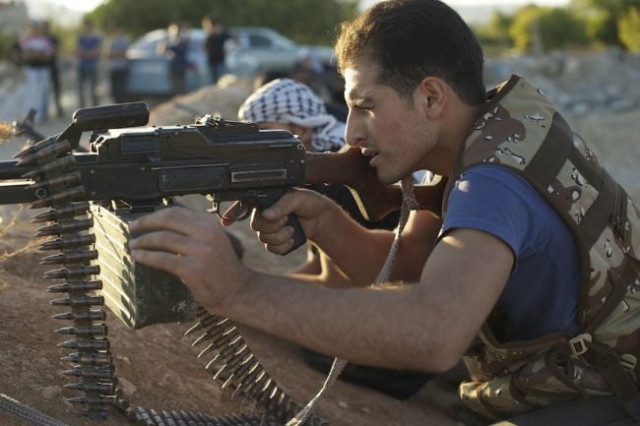'Hundreds of bodies' found in Syria town
At least 320 people have been killed during the offensive by government troops in Daraya.

At least 320 people have been killed during the offensive by government troops in Daraya, a satellite town of some 200,000 people to the southwest of the capital, the Syrian Observatory for Human Rights said.
The Local Coordination Committees, a network of activists on the ground in Syria, described it as "the regime's massacre" in "peaceful Daraya".
"The criminal regime imposed a blockade and cut off necessary supplies to the town, then subjected it to indiscriminate shelling with heavy weapons and warplanes," it said.
"Afterwards the gangs of killers entered the town and carried out summary executions, before dismembering and setting fire to the bodies."
Activists had described the onslaught against Daraya as a new bid to crush "once and for all" the insurgency in the capital after rebel fighters regrouped to the southern outskirts following an army offensive in the heart of the city last month.
The reports by the activists cannot be independently confirmed because of severe restrictions on media operating in Syria.
At least 183 people were killed nationwide on Saturday, the Observatory said, as the brutal conflict that has convulsed Syria for 17 months showed no signs of abating in the face of deep divisions among world powers.
Combat helicopters and tanks also pounded rebel-held areas of the battered northern city of Aleppo, an AFP journalist and monitors said, as the army pressed on with its war against fighters seeking to topple President Bashar al-Assad.
Militants put out on YouTube a video titled "Massacre at the Abu Sleiman Addarani Mosque in Daraya" showing dozens of bodies on the ground.
The video, whose authenticity could not be verified, had a commentary saying: "An odious massacre committed by the gangs of ther Assad regime in the Abu Sleiman Addarani Mosque. More than 150 innocent martyrs fell in a brutal campaign by the criminal gangs against the city."
State television had said on Saturday that Daraya, a mainly Sunni Muslim town, was being "purified of terrorist remnants."
The army claimed to have retaken most of Damascus in late July, after about two weeks of intense fighting across the capital's southern belt.
Most rebel Free Syrian Army fighters were forced out into the nearby countryside, but have since resumed hit-and-run operations, according to activists.
Saturday's bloodletting erupted a day after new international envoy Lakhdar Brahimi admitted he was "scared" of the enormity of the task he faces to try to end the increasingly ferocious conflict, now in its 18th month.
Brahimi, who takes over from former UN-Arab League envoy Kofi Annan next month, held talks with UN leaders in New York on Friday, saying the Syrian people "will be our first masters."
Annan, a former UN chief, quit earlier this month after the failure of his six-point plan to try to bring peace, which was left in tatters by the relentless bloodshed and divisions among world powers over how to tackle the conflict.
In Aleppo, an AFP correspondent reported heavy shelling by tanks in several neighbourhoods, sending civilians scrambling for safety as exploding shells sent up clouds of smoke and dust.
Rebels said earlier this week they controlled 60 percent of Aleppo but the regime has dismissed the claims and said Thursday the army had recaptured three Christian neighbourhoods, where residents are largely pro-Assad.
Opposition fighters said they were digging in for a war of attrition in Aleppo, the once thriving commercial hub where the regime had warned last month of "the mother of all battles."
"The situation? They are trying to advance in the area, we're holding them back, but there are a lot of wounded and martyrs," said one rebel commander in Saif al-Dawla neighbourhood.
Meanwhile, the body of a veteran Japanese war reporter killed this week during a gunfight in Aleppo was flown home on Saturday.
Mika Yamamoto, 45, was the fourth foreign journalist killed in Syria since March 2011 and the first to have died in Aleppo, which has borne the brunt of the conflict since fierce fighting erupted in the city last month.
An American, a Turk and a Jordanian journalist of Palestinian origin are still missing.
August is already the deadliest single month of the conflict with more than 4,000 people killed, according to the Observatory.
It says around 25,000 have been killed in the 17-month revolt, which began as a peaceful uprising against Assad's rule but has descended into a bloody civil war.
The United Nations puts the death toll at more than 17,000 -- up sharply from the 9,000 it reported when Annan's ill-fated ceasefire was first introduced in April.
Damascus has said it is ready to work with Brahimi and voiced hope he could pave the way for "national dialogue," while also suggesting it was ready to discuss Assad's exit as part of any negotiated solution.
An Iranian delegation was in Damascus for talks with Syrian officials, after Tehran -- the regime's staunchest ally -- said it would submit a plan for ending the conflict at a Non-Aligned Movement summit next week.
Tehran's initiative comes as its foes in the West seek to ramp up the pressure on Syria, with Washington and London threatening possible action if Damascus uses its chemical weapons and Paris voicing support for a partial no-fly zone.
International concerns are also mounting over the humanitarian crisis both in Syria and neighbouring countries after the United Nations said that the flow of refugees fleeing the fighting has jumped to at least 202,500.



















COMMENTS
Comments are moderated and generally will be posted if they are on-topic and not abusive.
For more information, please see our Comments FAQ